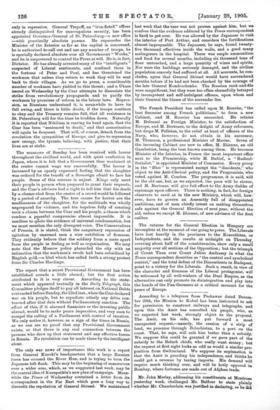The massaore of Sunday has been received with horror throughout
the civilised world, and with quiet exultation in Japan, where it is felt that a Government thus weakened at the centre cannot wage war successfully. The horror is increased by an openly expressed feeling that the slaughter was ordered for the benefit of a Sovereign afraid to face his people. Some of this censure is unjust. Kings only meet their people in person when prepared to grant their requests, and the Czar's advisers had a right to tell him that his death by a chance shot from the centre of a crowd would be followed by eperiod of anarchy. The true causes for horror are the needlessness of the slaughter, for the multitude was wholly unprepared for violence, and the hopeless folly of creating, such a chasm between the Czar and his people, a chasm which renders a ptaceful compromise almost impossible. It is needless to quote the evidence of universal condemnation, but we must mention the only divergent voice. The Conservatives of Prussia, it is stated, think the sanguinary repression of agitation by unarmed men a wise exhibition of firmness. They evidently believe that the soldiery form a caste apart from the people in feeling as well as organisation. We may note that the Moscow police placarded the city with an intimation that the workmen's revolt had been subsidised by English gold,—a libel which has called forth a strong protest from Sir Charles Hardinge.






















































 Previous page
Previous page